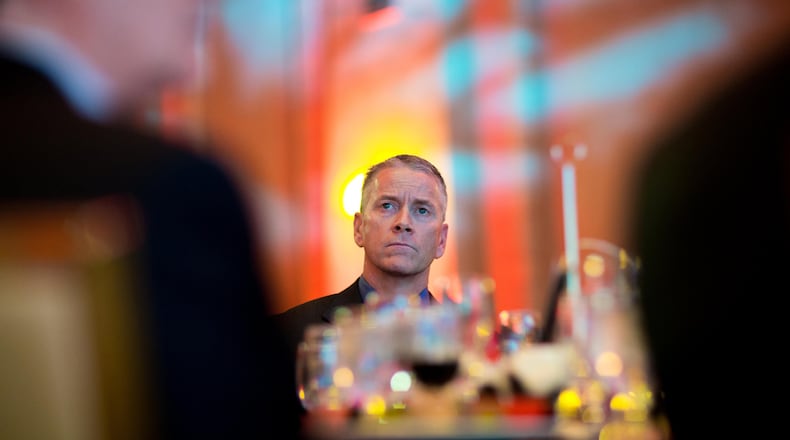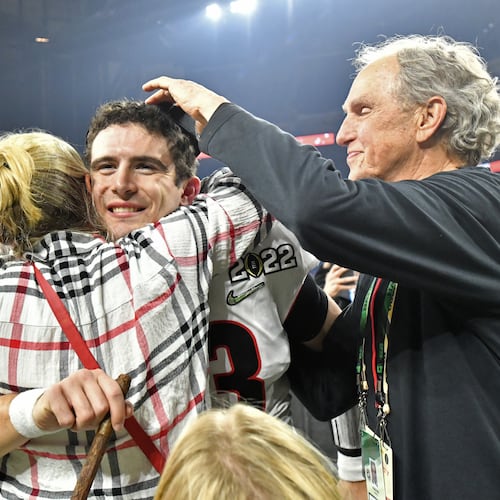As a union players’ rep the last time baseball was this discombobulated, former Brave Tom Glavine was about as popular with the fans as a $10 spilled beer.
He’s well away from all that now, retired for 12 years and 25 years past the baseball strike of 1994-95 in which he took up a position front and center. Players and owners are in the trenches once more, with some hardball negotiating to come as they try to find some way to restart the game in the time of the coronavirus.
Asked if this is one time he’s glad to be 54, and glad not to have the union responsibilities that came with his youth, Glavine couldn’t say yes quickly enough.
More than that, he added, “I’m probably happy I’m not a player, given the time.”
The issues that might divide ownership and the employees have so many more layers than the ones that cost the end of the 1994 season and the start of the Braves ’95 championship season. There are profound health and safety questions to ponder as well as all the economic calamities of a season potentially short on games and even shorter on revenue.
One thing Glavine knows for certain, it’s who the public will regard as the bad guy here if there is a stalemate over money.
“If it were to come down to an economic issue and that’s the reason baseball didn’t come back, you’re looking at a situation similar to the strike of ’94 and ’95 as far as fans are concerned,” he said.
“Even if players were 100% justified in what they were complaining about, they’re still going to look bad.”
One player already is looking quite the fool. Last week, Tampa Bay's Cy Young-winning pitcher Blake Snell casually proclaimed, in part, "I gotta get my money. I'm not playing unless I get mine, OK?" He was scheduled to make $7 million this year. At a time when those from the emergency room to the produce aisle are risking far more for far less, Snell's comments came off as arrogant and ignorant. Stars like Bryce Harper and Nolan Arenado, however, back up his comments.
Even if Snell had a point somewhere in his babble, it got lost in the tone-deafness of his words. “That’s the problem when you get guys out there saying things, it never helps the situation,” Glavine said, biting his tongue where Snell seemed incapable.
Back in other dark days, when a strike cost baseball its final 49 regular-season games and the entire postseason in 1994 and the first 18 games of ’95, Glavine had plenty to say about the situation. As one of the more willing of union spokesmen, he was far more articulate than some goofball in Tampa.
Still, because he thought it so important to share, Glavine became a face of the work stoppage and caught heaping amounts of grief from disappointed fans. Going on to win the most significant game in Braves history – throwing a one-hit shutout for eight innings in the World Series clincher in 1995 – and putting together a Hall of Fame career went a long way toward repairing the breach.
Looking back now, he says, “The accessibility thing was a miscalculation on my part. I just felt like if I did an interview on the radio or TV, if I had five or 10 minutes, I could make somebody understand what was going on and come to our side. That just wasn’t going to happen.”
Today’s players may well face the same kind of backlash even as they express legitimate apprehensions.
As Glavine put it: “I understand that a big part for all of us in getting back to our normal is to have sports back. But you can’t dismiss a player’s concern for his health or his family’s health any more than you would dismiss your own concerns.
“For me here now, Georgia is open to some degree. I can choose what I want to do. I can choose how much I want to expose myself. When you’re starting to get on planes and travel as a sport, you’ve lost control over that. Now you’re trusting in everybody else providing an environment for you that is safe.
“If I was playing today, I wouldn’t say, ‘Hell no, I’m not playing.’ But of course, I’d have a concern that once you step out that door and you go back into that world, there’s a chance you’re bringing something home to your family. It’s 100 percent fair for players, coaches, everybody to be concerned about that.”
It’s undetermined precisely how players would navigate through a shortened season and how they might limit contact with the outside world, including family.
On the economic front, players have agreed to take a pro-rated portion of their salaries this year. Ownership has come back and further asked to split the reduced revenue this season equally with the players, raising union fears that this would be a first step toward a salary cap. All suspicion is well-founded. It’s an old fight (and yes it was fought in ’94). Unable to control themselves, baseball owners have long sought some kind of cap to do that for them.
Glavine is particularly measured in this matter, understanding both old labor wars and the uniqueness of now:
“When you hear a 50-50 split of revenue, anybody who has at all familiar with the union and collective bargaining agreements know that a 50-50 revenue split is a salary cap,” he said. “Now again, we’re in an extenuating circumstance. You have to have conversations about how it’s all going to play out, but you have to understand that 50-50 revenue split to the union is a scary proposition.
“Does that mean they’re not going to be willing to sit down and try to figure something out? In a time where you’ve lost half a season at minimum, would you expect that the owners would have to pay everyone’s full salary? I probably wouldn’t. What the solution is, I don’t know. It’s something they need to sit down and figure out.”
The good union man is coming at this one also as a fan, who while splitting time between homes in Atlanta and Florida with his family is missing the entertainment of second-hand sports. He’s also missing the broadcast booth, where he is wont to sit on high and analyze Braves games.
The one-time two-sport guy, a 1984 L.A. Kings draft pick, confesses to longings that extend well beyond the diamond.
“I probably miss NHL playoffs more than baseball, at least this time of year,” Glavine admitted with a chuckle. “It’s part of the routine, it’s nice to do what you do all day, eat dinner and then sit down and watch some kind of game. Not having games to watch has been hard. But, you know, we’ll get through it.”
Did in 1994-95. Will again in 2020.
About the Author
The Latest
Featured


